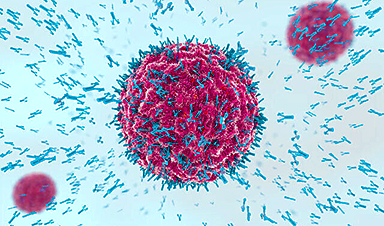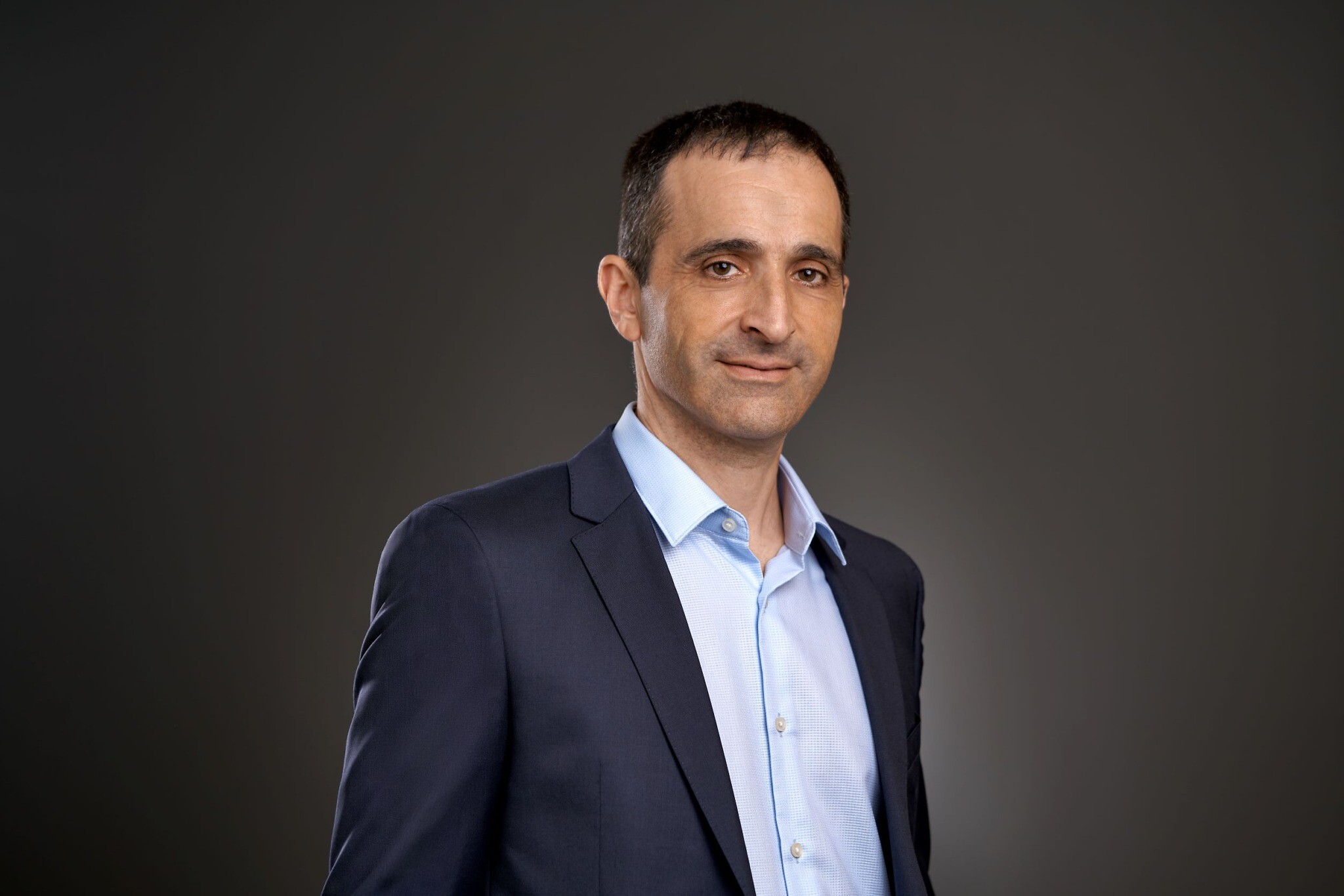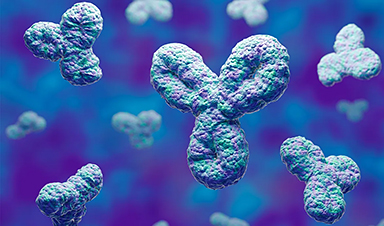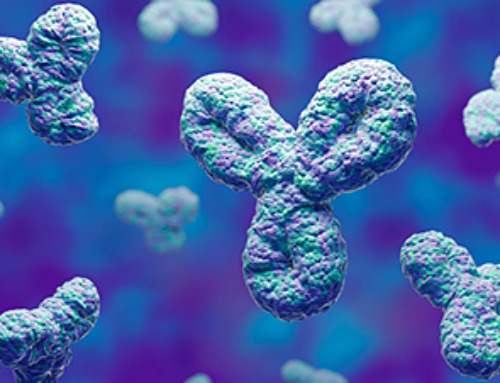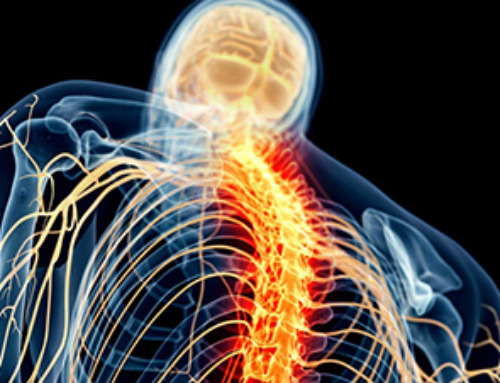Cancer patients are testing a medicine made of antibodies that were designed from scratch on a computer in Israel and whose inventor has “programmed” them to “decide” whether cells surrounding tumors are bad or good.
If the trial, which is underway in Australia, goes according to plan, these antibodies will fight cells that help the tumor while boosting the abilities of cells that inhibit cancer growth.
Their inventor, Prof. Yanay Ofran, said that until now, antibody treatments have been based on human or animal antibodies. They are then developed in labs and mass produced, but the final product retains limitations from the original antibodies.
“Antibodies are very successful, but the way they are used in medicine today utilizes only a fraction of their capability,” he told The Times of Israel. “Our mission is to take antibodies and seize on the fact they are safe, stable, easy to use and can stay on the shelf for years, to unlock their full ability.”
Ofran, a Bar Ilan University professor, has published numerous peer-reviewed studies on his method of designing antibodies on a computer. They emphasize the “smart” quality of the new antibodies.
This means that instead of carrying out a single function, like fighting a single virus, they can survey their surroundings and act in different ways when faced with different types of cells. Ofran refers to them as “nano-robots.”
The new AU-007 antibody treatment is the first computer-designed antibody to enter a human trial, he said. It was designed by artificial intelligence software at the Rehovot offices of his startup Biolojic Design, and is being trialed by its spin-out company Aulos Bioscience. Biolojic is now working on several other treatments.
Ofran’s breakthrough results from a laborious research process, which involves creating many millions of antibodies and monitoring their behavior in the lab.
His team’s artificial intelligence software analyzes the data on how the antibodies behave. “We learn from the observations we collect how to create a new antibody that will do exactly what we want it to do,” said Ofran.
AU-007 uses antibodies that can “feel” or “sense“ their surroundings and differentiate between cells that are likely to help or hinder a tumor based on features on the cell’s exterior such as cilia, which are protruding antenna-like structures.
“What we’re doing is to use the antibody to identify the cells they meet, and activate cells that can attack the tumor while stopping cells that help the tumor,” Ofran explained.
Ofran is a descendent of one of Israel’s best-known scientists. His grandfather Prof. Yeshayahu Leibowitz, while most remembered for his religious and political writing, was a professor of organic chemistry and neurology, and a leader in those fields during Israel’s early decades.
Ofran hopes that his work will change scientists’ understanding of the potential of antibodies. Today they are generally deployed to perform a single task — for example, to neutralize coronavirus. As he puts it, they are “one-trick ponies.”
Designing antibodies by computer opens up the possibility of making them multi-function, as illustrated by AU-007’s ability to boost cancer-fighting cells but do the opposite with cells that help cancer.
“Instead of just seeking out one environment and reacting always with the same response, we’re producing antibodies that can act conditionally, meaning if the cells appear one way they do ‘x,’ and if they look another way they do ‘y,’” Ofran said.
“This opens up the door to smarter therapeutics that can execute sophisticated plans to cure disease.”
News
Specially engineered antibody delivers RNA therapy to treatment-resistant tumors
Elias Quijano, PhD; Diana Martinez-Saucedo, PhD; Zaira Ianniello, PhD; and Natasha Pinto-Medici, PhD, there are 25 other contributors, most from Yale's Department of Therapeutic Radiology and from the departments of genetics, molecular biophysics and [...]
Vaccinated women face fewer cervical cancer risks
New data from Denmark shows the HPV vaccine’s powerful long-term impact, while also revealing why cervical cancer screening is still essential. A Danish study published in the journal Eurosurveillance reports that women who received the human [...]
3D-printed implant offers a potential new route to repair spinal cord injuries
A research team at RCSI University of Medicine and Health Sciences has developed a 3-D printed implant to deliver electrical stimulation to injured areas of the spinal cord, offering a potential new route to [...]
Nanocrystals Carrying Radioisotopes Offer New Hope for Cancer Treatment
The Science Scientists have developed tiny nanocrystal particles made up of isotopes of the elements lanthanum, vanadium, and oxygen for use in treating cancer. These crystals are smaller than many microbes and can carry isotopes of [...]
New Once-a-Week Shot Promises Life-Changing Relief for Parkinson’s Patients
A once-a-week shot from Australian scientists could spare people with Parkinson’s the grind of taking pills several times a day. The tiny, biodegradable gel sits under the skin and releases steady doses of two [...]
Weekly injectable drug offers hope for Parkinson’s patients
A new weekly injectable drug could transform the lives of more than eight million people living with Parkinson's disease, potentially replacing the need for multiple daily tablets. Scientists from the University of South Australia [...]
Most Plastic in the Ocean Is Invisible—And Deadly
Nanoplastics—particles smaller than a human hair—can pass through cell walls and enter the food web. New research suggest 27 million metric tons of nanoplastics are spread across just the top layer of the North [...]
Repurposed drugs could calm the immune system’s response to nanomedicine
An international study led by researchers at the University of Colorado Anschutz Medical Campus has identified a promising strategy to enhance the safety of nanomedicines, advanced therapies often used in cancer and vaccine treatments, [...]
Nano-Enhanced Hydrogel Strategies for Cartilage Repair
A recent article in Engineering describes the development of a protein-based nanocomposite hydrogel designed to deliver two therapeutic agents—dexamethasone (Dex) and kartogenin (KGN)—to support cartilage repair. The hydrogel is engineered to modulate immune responses and promote [...]
New Cancer Drug Blocks Tumors Without Debilitating Side Effects
A new drug targets RAS-PI3Kα pathways without harmful side effects. It was developed using high-performance computing and AI. A new cancer drug candidate, developed through a collaboration between Lawrence Livermore National Laboratory (LLNL), BridgeBio Oncology [...]
Scientists Are Pretty Close to Replicating the First Thing That Ever Lived
For 400 million years, a leading hypothesis claims, Earth was an “RNA World,” meaning that life must’ve first replicated from RNA before the arrival of proteins and DNA. Unfortunately, scientists have failed to find [...]
Why ‘Peniaphobia’ Is Exploding Among Young People (And Why We Should Be Concerned)
An insidious illness is taking hold among a growing proportion of young people. Little known to the general public, peniaphobia—the fear of becoming poor—is gaining ground among teens and young adults. Discover the causes [...]
Team finds flawed data in recent study relevant to coronavirus antiviral development
The COVID pandemic illustrated how urgently we need antiviral medications capable of treating coronavirus infections. To aid this effort, researchers quickly homed in on part of SARS-CoV-2's molecular structure known as the NiRAN domain—an [...]
Drug-Coated Neural Implants Reduce Immune Rejection
Summary: A new study shows that coating neural prosthetic implants with the anti-inflammatory drug dexamethasone helps reduce the body’s immune response and scar tissue formation. This strategy enhances the long-term performance and stability of electrodes [...]
Scientists discover cancer-fighting bacteria that ‘soak up’ forever chemicals in the body
A family of healthy bacteria may help 'soak up' toxic forever chemicals in the body, warding off their cancerous effects. Forever chemicals, also known as PFAS (per- and polyfluoroalkyl substances), are toxic chemicals that [...]
Johns Hopkins Researchers Uncover a New Way To Kill Cancer Cells
A new study reveals that blocking ribosomal RNA production rewires cancer cell behavior and could help treat genetically unstable tumors. Researchers at the Johns Hopkins Kimmel Cancer Center and the Department of Radiation Oncology and Molecular [...]
